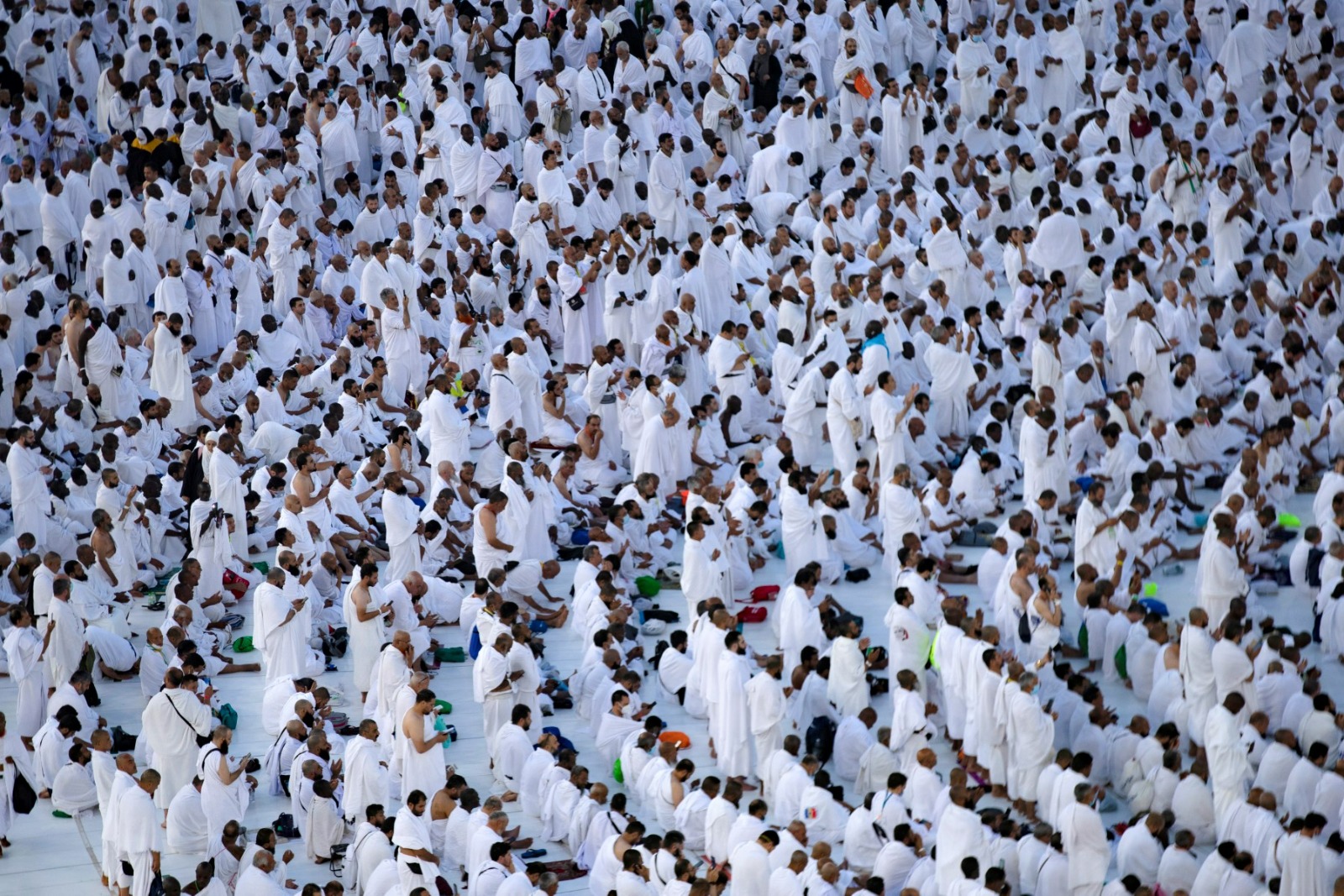MINA, Saudi Arabia: Hundreds of thousands of pilgrims journeyed from Saudi Arabia's Makkah to a white-tented city in Mina on Thursday as they neared the highlight of the biggest hajj ritual since the coronavirus pandemic began. Worshippers took buses or walked to Mina, seven kilometers from Makkah's Grand Mosque, Islam's holiest site, where they circled the imposing black Kaaba at the start of the rituals on Wednesday.
Dressed in simple white robes, the pilgrims will spend the night in the air-conditioned white tents of Mina, which sits in a narrow valley surrounded by rocky mountains and is transformed each year into a vast encampment. "I feel great. This is all to be closer to God," Tunisian pilgrim Khaled Bin Jomaa, 44, said as he entered the camp on foot, carrying an umbrella and a prayer mat.
The pilgrims are positioning themselves for the highlight of the hajj on Friday: Ascending Mount Arafat, where Prophet Muhammad (PBUH) delivered his final sermon. Worshippers will pray and recite the Holy Quran for several hours at the mountain and sleep nearby. On Saturday, they will gather pebbles and perform the symbolic "stoning of the devil".
The hajj, one of the world's biggest religious gatherings, has not gone smoothly for everyone. Saudi Arabia's hajj ministry demanded the sacking of two top officials at a company that organizes pilgrimages, over their failure to provide decent services, the official Saudi Press Agency said on Thursday.
State-run Al-Ekhbariya TV said the company handled pilgrimages from overseas and was responsible for "problems with food and accommodation" including a lack of air conditioning at the Mina camp. Fridges packed with yoghurt, juice and water were waiting at the temporary accommodation in Mina, along with a food buffet and fruit baskets.
 MINA: Pilgrims arrive at their tents near the holy city of Makkah on July 7, 2022 during the annual hajj pilgrimage. - AFP
MINA: Pilgrims arrive at their tents near the holy city of Makkah on July 7, 2022 during the annual hajj pilgrimage. - AFPThe crowds, capped at one million including 850,000 from abroad chosen by lottery, are the biggest since 2019 after two COVID-hit years when only tens of thousands were allowed. All worshippers are fully vaccinated and submitted negative PCR tests, but the rituals are taking place against the backdrop of a resurgence of COVID-19 in the region.
Some Gulf countries have tightened restrictions to keep outbreaks in check. The hajj ministry has said it is working on the highest levels of health precautions in light of the pandemic and the emergence of new variants. At Mina, the pilgrims were handed small bags containing masks and sanitizer, and ambulances were parked at the camp's entrances.
However, a requirement to wear masks has been largely ignored. Temperatures of 42 degrees Celsius are another challenge. Four hospitals and 26 health centers have been prepared at Mina to treat pilgrims who might fall ill. "We have taken all precautions. We have doctors here ready to intervene in case needed," said Ahmad Al-Zinani, a camp manager.
The hajj is one of the five pillars of Islam and must be undertaken by all Muslims with the means to do so at least once in their lives. Saudi state media reported that Mauritania's president and Indonesia's vice president were among the pilgrims landing in Jeddah on Thursday to perform the rituals.
Military helicopters will be used "around the clock... to support the public security", the commander of the Air Force Group participating in this hajj season, Colonel Khaled bin Abdullah Al-Mutairi, told state media. Overseas pilgrims were banned from the hajj in 2020 and 2021 to prevent COVID infections but they are back in the mountainous region this year, filling hotel rooms and visiting shops as business owners hope to recover their pandemic losses.
Tight security
The hajj, usually one of the world's largest annual religious gatherings, is one of the five pillars of Islam and must be undertaken by all Muslims with the means at least once in their lives. In 2019, some 2.5 million Muslims from around the world participated in the hajj which poses a considerable security challenge and has seen several disasters over the years, including a 2015 stampede that killed up to 2,300 people.
The rituals are being performed under strict security measures that include police check-points in parts of Mecca. In 1979, gunmen barricaded themselves inside the Grand Mosque in an assault that left 153 dead, according to the official toll.
The Commander of the Air Force Group participating in this hajj season, Colonel Pilot Khaled bin Abdullah Al-Mutairi, told state media Wednesday that military helicopters will be used "around the clock... to support the public security". Overseas pilgrims, who were banned from the hajj in 2020 and 2021 to prevent Covid infections, are back to the mountainous region this year to fill its hotel rooms and visit its shops as business owners hope to recover huge losses.
Since the start of the pandemic, Saudi Arabia has registered more than 795,000 coronavirus cases, more than 9,000 of them fatal. Some 67 million vaccine doses have been administered in the country of over 34 million people. The hajj ministry has said it is working on the highest levels of health precautions in light of the pandemic and the emergence of new variants. However, a requirement to wear masks has been largely ignored. — AFP












